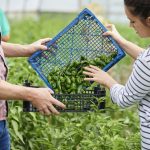In the ever-evolving landscape of modern agriculture, the role of agrochemicals has become increasingly prominent. These substances, which include fertilizers, pesticides, herbicides, and fungicides, are integral to maximizing agricultural productivity. As the global population continues to grow, the demand for food increases, placing immense pressure on farmers to enhance crop yields while maintaining sustainability. This article explores the key components of agrochemicals, their benefits in enhancing crop yields, the environmental concerns they raise, and future trends that may shape the agricultural industry.
Understanding Agrochemicals: Key Components of Agriculture
Agrochemicals encompass a broad range of products used in farming to manage pests, weeds, and soil fertility. Fertilizers are perhaps the most widely recognized type, providing essential nutrients like nitrogen, phosphorus, and potassium that are crucial for plant growth. Pesticides, on the other hand, are designed to protect crops from insects, diseases, and other detrimental organisms. Herbicides target unwanted plants that compete with crops for resources, while fungicides help prevent fungal infections that can decimate yields. Together, these agrochemicals form a vital toolkit for farmers.
The application of agrochemicals has a profound impact on agricultural practices. The use of synthetic chemicals has revolutionized farming, allowing for the cultivation of high-yield crops and reducing losses caused by pests and diseases. This has enabled farmers to produce more food on less land, which is critical in a world with limited arable land. Moreover, advancements in precision agriculture have enhanced the effectiveness of agrochemicals, allowing farmers to apply them in targeted ways that optimize their benefits while minimizing waste.
However, the reliance on agrochemicals has also sparked debates regarding their safety and long-term impact on ecosystems. The formulation and application of these chemicals must be monitored closely to avoid adverse effects on human health and the environment. As agriculture faces the dual challenge of feeding a growing population while addressing ecological concerns, understanding the role of agrochemicals becomes crucial for informed decision-making.
Benefits of Agrochemicals in Enhancing Crop Yields
One of the most significant advantages of agrochemicals is their ability to dramatically increase crop yields. Fertilizers boost soil fertility, leading to healthier plants that can produce more grain, fruit, or vegetables. For example, the introduction of nitrogen-based fertilizers has been linked to a substantial increase in cereal production worldwide. Without these enhancements, many regions would struggle to meet the food demands of their populations.
In addition to fertilizers, the use of pesticides can prevent significant losses caused by pests and diseases. Farmers who utilize pesticides effectively can protect their crops from infestations that might otherwise devastate harvests. The economic benefits are substantial; enhanced crop protection and yield can lead to increased income for farmers, enabling them to invest further in their operations and improve livelihoods within their communities.
The impact of agrochemicals extends beyond individual farmers; it affects entire economies and food supply chains. The increased efficiency and productivity that result from the use of agrochemicals can lead to lower food prices for consumers and greater food security for nations. As food production keeps pace with population growth, the importance of agrochemicals in modern agriculture becomes even more pronounced.
Environmental Concerns: Balancing Use and Sustainability
Despite their benefits, the use of agrochemicals raises significant environmental concerns. One of the primary issues is the potential for soil degradation and contamination of water sources. Excessive application of fertilizers can lead to nutrient runoff, which contaminates rivers and lakes, causing harmful algal blooms that disrupt aquatic ecosystems. Additionally, the long-term use of certain pesticides can lead to the development of resistant pest populations, prompting a cycle of increased chemical use that can further harm the environment.
Another concern is the impact of agrochemicals on biodiversity. The widespread use of herbicides can result in the decline of non-target plant species, disrupting local ecosystems and reducing habitat for wildlife. Pollinators, which are essential for many crops, are particularly vulnerable to the effects of pesticides. The loss of biodiversity not only threatens environmental health but also jeopardizes agricultural sustainability, as diverse ecosystems contribute to resilience against pests and diseases.
To address these challenges, a balanced approach to agrochemical use is essential. Integrated Pest Management (IPM) and sustainable agricultural practices encourage the judicious use of chemicals, combining them with crop rotation, organic farming methods, and biological control strategies. By adopting these practices, farmers can maintain productivity while minimizing negative environmental impacts, ultimately contributing to a more sustainable agricultural system.
Future Trends: Innovations in Agrochemicals and Farming
Looking ahead, the future of agrochemicals and their role in agriculture is likely to be shaped by innovation and technological advancements. Researchers are exploring the development of biodegradable agrochemicals that minimize environmental impact while maintaining efficacy. These new formulations could reduce the persistence of harmful residues in the soil and waterways, thereby promoting healthier ecosystems.
Another promising trend is the emergence of precision agriculture technologies, such as drones and remote sensing. These tools allow farmers to assess crop health and apply agrochemicals more accurately and efficiently. By delivering targeted treatments based on specific needs, precision agriculture can optimize the use of fertilizers and pesticides, reducing waste and environmental impact while maximizing yields.
Moreover, the integration of biotechnology and genetically modified organisms (GMOs) holds the potential for significant advancements in agrochemicals. Crops can be engineered to be more resilient to pests and diseases or to require fewer chemical inputs. As farming practices evolve, the collaboration between technology, agrochemicals, and sustainable practices will be critical for addressing the challenges of food production in a changing world.
In summary, agrochemicals play a vital role in modern farming practices, providing benefits that extend from individual farmers to global food systems. While their advantages in enhancing crop yields cannot be overlooked, a balanced approach is essential to mitigate environmental risks and promote sustainability. As innovations continue to emerge, the future of agrochemicals holds promise for more sustainable and efficient agricultural practices that can help meet the demands of a growing population while preserving the planet’s ecological integrity. The challenge lies in harnessing these tools responsibly, ensuring that agriculture can thrive alongside biodiversity and environmental health.








